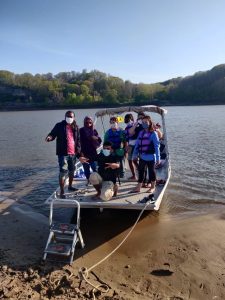The University of Missouri College of Agriculture, Food and Natural Resources (CAFNR) International Programs (CIP) team provides technical assistance to international partners and facilitates global engagement for faculty and students across the College.
Recently, CIP developed an International Engagement Program, with a focus on connecting international graduate students with their peers.
“Everybody in the CAFNR International Programs office understands what it is like to be away from family and to be in a new or strange environment, so we wanted to make sure that all of our international graduate students were getting the support they needed to feel like their time at MU was a highlight of their lives and something they could remember fondly,” said Kerry Clark, CIP director and assistant research professor of rural sociology. “Many of those students already mentor each other within academic programs, but the International Engagement Program will also give them opportunities to meet students outside of their own disciplines or nationalities, thus enriching everyone with new ideas, viewpoints and experiences.”
Clark said that while the students will probably discuss their research at times, that isn’t the primary focus of the group.
“The group will be driven by what the students want, but I think the focus is largely to provide a community to our students that is not dependent on their academic contributions,” she said. “We want to facilitate opportunities for students to do things outside of their research and studies.”
Clark said outings that allow students to get to know each other on a more personal level are very important. The group recently took a boat ride on the Missouri River with MO River Relief.

Lindsey Saunders, projects manager for CIP, added that many CAFNR international students don’t always have a local support system in place. It can be even tougher for graduate students, who are generally busy with their research projects as they work toward their degree. The hope is that the group will help connect students and give them that support system.
“It can be really hard to connect with other students in graduate school, and when you add language barriers and cultural difference, it requires additional efforts and patience,” Saunders said.
The importance of interaction and connection has been stressed even more during the COVID-19 pandemic.
“Before being a student, we are all humans, and I believe we need to learn more from the world outside of textbooks and courses,” said Rishabh Mahendra, a graduate student studying agricultural and applied economics. “For international students, especially those who are out of their country for the first time, an international student’s group acts as an ice breaker. Such groups are of more importance now more than ever, as due to the pandemic, we have all been, mostly, physically away.
“Also, one might earn perfect marks as a student by working hard, but when several years pass, what one remembers is not how much they worked to get that score, but the memories that they built during their studies. Back in India, where I was during the five years of my integrated masters program, I made friends from almost all parts of India, and it felt really nice knowing what they eat, and the traditions and festivals they practice. I get a similar feeling from this group and want to fully contribute to strengthen it.”
Miguel Salceda, a graduate student studying in the School of Natural Resources, said that learning more about other cultures is a key part of the graduate student experience.
“As a graduate student, our lives can become intensely focused on getting work done to get the desired degree, which causes stress and limits the international experiences in the United States,” he said. “Also, life is complex and requires several factors to be fulfilled to get to the state called ‘happiness.’ Having the opportunity to chat and know other graduate students is great because it opens your mind to different cultures and beliefs. Besides, participating in extra-curricular activities contributes to our physical and spiritual health. I consider this group an excellence initiative, and I am glad Dr. Clark is doing it!
“It is also exciting to get to know other students’ perspectives toward life and everyday social issues because we create opinions based on our personal experiences, which can sometimes be biased. Having another point of view can be refreshing. The variety of disciplines that the students develop also favors healthy discussions and promotes opportunities to open our minds. I look forward to the group activities because we all enjoy hanging out in a relaxing environment.”
Mahendra said that he hopes more graduate students from the United States look to join the group as well.
“I have been quite interested in different cultures and hence have made efforts in past to learn about a few, but I am sure most people are still living with what they have been seen and heard within their boundaries,” Mahendra added. “In such groups, we get opportunities to understand different cultures and perspectives. When we discuss our ideas with others, and hear their opinions, and we learn from them, too. The only thing the group lacks is local students. I believe international students could learn a lot about the U.S. from them.”
Graduate students who are interested in being a part of the group are welcome to contact the CIP office at 573-882-0092 or email Clark.